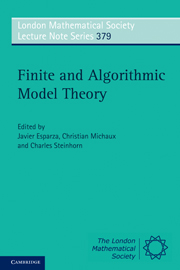Book contents
- Frontmatter
- Contents
- Preface
- 1 Automata-based presentations of infinite structures
- 2 Logical aspects of spatial databases
- 3 Some connections between finite and infinite model theory
- 4 Definability in classes of finite structures
- 5 Algorithmic meta-theorems
- 6 Model theoretic methods for fragments of FO and special classes of (finite) structures
- Bibliography
6 - Model theoretic methods for fragments of FO and special classes of (finite) structures
Published online by Cambridge University Press: 01 June 2011
- Frontmatter
- Contents
- Preface
- 1 Automata-based presentations of infinite structures
- 2 Logical aspects of spatial databases
- 3 Some connections between finite and infinite model theory
- 4 Definability in classes of finite structures
- 5 Algorithmic meta-theorems
- 6 Model theoretic methods for fragments of FO and special classes of (finite) structures
- Bibliography
Summary
Abstract
Some prominent fragments of first-order logic are discussed from a game-oriented and modal point of view, with an emphasis on model theoretic techniques for the non-classical context. This includes the context of finite model theory as well as the model theory of other natural non-elementary classes of structures. We stress the modularity and compositionality of the games as a key ingredient in the exploration of the expressive power of logics over specific classes of structures. The leading model theoretic theme is expressive completeness – or the characterisation of fragments of first-order logic as expressively complete over some class of (finite) structures for first-order properties with some prescribed semantic preservation behaviour. In contrast with classical expressive completeness arguments, the emphasis here is on explicit model constructions and transformations, which are guided by the game analysis of both first-order logic and of the imposed semantic constraints.
keywords: finite model theory, model theoretic games, bisimulation, modal and guarded logic, expressive completeness, preservation and characterisation theorems
Introduction
Expressiveness over restricted classes of structures
The purpose of this survey is to highlight game-oriented methods and explicit model constructions for the analysis of fragments of first-order logic, in particular in restriction to non-elementary classes of structures. The following is meant to highlight and preview some key points in terms of both the material to be covered and the perspective that we want to adopt in its presentation.
- Type
- Chapter
- Information
- Finite and Algorithmic Model Theory , pp. 271 - 338Publisher: Cambridge University PressPrint publication year: 2011
- 4
- Cited by

